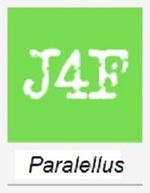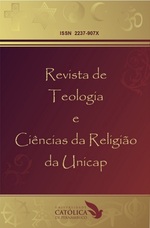PHENOMENOLOGICAL INTUITION AND ITS APPLICATION TO THE ANALYSIS OF RELIGION IN PAUL TILICH
DOI:
https://doi.org/10.25247/paralellus.2022.v13n32.p197-223Keywords:
Phenomenological Intuition, Philosophy of Religion, Systematic Theology, Paul TillichAbstract
This article is a theoretical-bibliographic analysis of Paul Tillich's phenomenological intuition in his texts in the Germanic period (1919-1925) and the American period (1933-1963), mainly in the works Philosophy of Religion (1925) and Systematic Theology (1951). Recognizing the validity and limitations of the phenomenological method for studies of religion, the theologian made an original appropriation of philosophical phenomenology. In order to present and analyze the author's phenomenological intuition and its application to the analysis of religion, the text is structured into four topics. These are based on primary works and commentators by Paul Tillich in area 44 (Sciences of Religion and Theology). First, it will be shown how Tillich's phenomenological intuition can be an interesting method in the investigation of the religious phenomenon. Then, it will be verified the tillichian determination of religion and its appropriation of the theory of Husserlian intentionality in the Germanic period. Consequently, the reasons that led the theologian to prefer and criticize the phenomenological method in his philosophy of religion will be presented. Finally, the way in which the author thought about his critical phenomenology and applied it in his systematic theology will be highlighted. Aware of the Husserlian and Heideggerian phenomenological influence on Tillich's thought, it should be noted that the phenomenology present in his productions is unique and original. Therefore, it is noteworthy that the tillichian phenomenological intuition is a consistent and interesting method for a phenomenology of religious experience in religious studies.
Keywords: Phenomenological Intuition; Philosophy of Religion; Systematic Theology; Paul Tillich.
Downloads
References
ABREU, Fábio Henrique. “Richtung auf das Unbedingte” and “Self-Transparency”: The Foundations of Paul Tillich’s Philosophy of Spirit, Meaning, and Religion (1919-1925). Revista Eletrônica Correlatio, v. 16, n. 1 - Junho de 2017.
ABREU, Fábio Henrique. Símbolo como linguagem da religião: fundamento da teoria dos símbolos no âmbito da teoria da religião de Paul Tillich. In: TADA, Elton Sadao; SOUZA, Vitor Chaves (Org.). Paul Tillich e a Linguagem da Religião. Santo André: Kapenke, 2018.
BALEEIRO, Cleber Araújo Souto. A fé como estado de preocupação última: interpretação da noção de risco da fé na obra de Paul Tillich. (Tese de doutorado). Programa de Pós-graduação em Ciências da Religião / Universidade Metodista de São Paulo. São Bernardo do Campo, 2017.
BULTMANN, Rudolf. Jesus Cristo e Mitologia. Tradução de Daniel Costa. 1ª edição. São Paulo: Fonte Editorial, 2000.
CALVANI, Carlos Eduardo. A fronteira é o melhor lugar para adquirir conhecimento – circunstâncias históricas e pessoais da formação de Tillich. Estudos de Religião, v. 30, n. 3, 2016, p.165-188.
CARVALHO, G. A interpretação da simbólica da queda em Paul Tillich: Um estudo em hermenêutica teológica. (Dissertação de mestrado). Programa de Pós-graduação em Ciências da Religião / Universidade Metodista de São Paulo. São Bernardo do Campo, 2007.
DANZ, C. Die Religion in der Kultur. Karl Barth und Paul Tillich über die Grundlagen einer Theologie der Kultur. In: DANZ, C .; SCHÜßLER, W. (Hrs.). Paul Tillichs Theologie der Kultur: Aspekte, Probleme, Perspektiven. Berlim; Boston: Walter de Gruyter GmbH & Co. KG, 2011, p. 211-227.
FILORAMO, Giovanni; PRANDI, Carlo. As ciências das religiões. Tradução José Maria de Almeida. São Paulo: Paulus, 1999.
GOTO, T. A. O fenômeno religioso: Fenomenologia em Paul Tillich. São Paulo: Paulus, 2004.
HEIDEGGER, Martin. Phänomenologie des religiösen Lebens. Gesamtausgabe 60. Frankfurt am Main: Vittorio Klostermann, 1995a.
HEIDEGGER, Martin. Ontologie. Hermeneutik der Faktizität. Gesamtausgabe 63. Frankfurt am Main: Vittorio Klostermann, 1995b.
HEIDEGGER, Martin. Marcas do Caminho. Petrópolis: Vozes, 2008.
HIGUET, Etienne A. Os métodos da filosofia da religião de Paul Tillich. Revista Eletrônica Correlatio, n. 20, 2011, p. 27- 41.
HUSSERL, E. Ideas relativas a una fenomenología pura y una filosofía fenomenológica. Cidade do México: Fondo de Cultura Económica, 1949.
KELM, Thiago Rafael Englert. Implicações da teoria da intencionalidade da consciência de Edmund Husserl para o desenvolvimento da teologia da cultura em Paul Tillich. In: TADA, Elton Sadao; SOUZA, Vitor Chaves (Org.). Paul Tillich e a Linguagem da Religião. Santo André: Kapenke, 2018.
MENDONÇA, Antônio Gouvêa. Fenomenologia da experiência religiosa. In: CRUZ, Eduardo R. & MORI, Geraldo de. Teologia e Ciências da religião: a caminho da maioridade acadêmica no Brasil. São Paulo: Paulinas, 2011.
MUELLER, E. R. Entre a religião e seu conceito: Questões fundamentais da filosofia da religião em Paul Tillich nos anos 20. Numen – Revista de estudos e pesquisa da religião, v. 9, n. 1, 2006.
TILLICH, P. Dinâmica da Fé. [1957] 6a ed. São Leopoldo: Editora Sinodal, 1985.
TILLICH, P. Filosofía de la religión. [1925] Buenos Aires: La Aurora, 1973.
TILLICH, P. La dimensión perdida: Indigencia y esperanza de nuestro tiempo. Bilbao: Desclée de Brouwer, 1970.
TILLICH, P. Teologia da cultura. São Paulo: Fonte editorial, 2009.
TILLICH, P. Teologia Sistemática. [1951] 6a ed. São Leopoldo: Sinodal/EST, 2014.
TILLICH, P. No Limite. São Paulo: Fonte Editorial, 2016.
TILLICH, P. Perspectivas da teologia protestante nos séculos XIX e XX. 2ª ed. São Paulo: ASTE, 1999.
Downloads
Published
Issue
Section
License
Copyright (c) 2022 Paulo Sérgio Lopes Gonçalves, Henrique Nilo da Silva

This work is licensed under a Creative Commons Attribution 4.0 International License.
A submissão de originais para a Paralellus implica a transferência, pelos autores, dos direitos de publicação eletrônica. Os direitos autorais para os artigos veiculados neste periódico são do autor; todavia, são da revista os direitos sobre a primeira publicação. Os autores somente poderão fazer uso dos mesmos resultados em outras publicações se indicarem, claramente, que a Paralellus foi o meio originalmente utilizado. Em decorrência do fato de ser a Paralellus uma revista de acesso público, é permitida a utilização gratuita dos artigos em aplicações educacionais e/ou científicas não comerciais, desde que respeitando-se a exigência de citação da fonte (Texto atualizado em 16-11-2020).
















